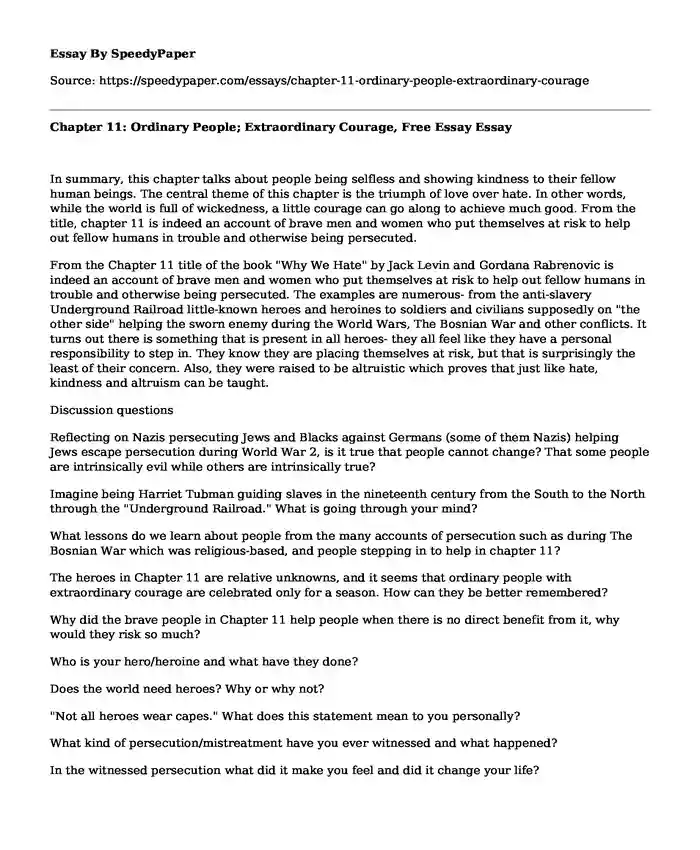
| Type of paper: | Article review |
| Categories: | Literature Human |
| Pages: | 2 |
| Wordcount: | 523 words |
In summary, this chapter talks about people being selfless and showing kindness to their fellow human beings. The central theme of this chapter is the triumph of love over hate. In other words, while the world is full of wickedness, a little courage can go along to achieve much good. From the title, chapter 11 is indeed an account of brave men and women who put themselves at risk to help out fellow humans in trouble and otherwise being persecuted.
From the Chapter 11 title of the book "Why We Hate" by Jack Levin and Gordana Rabrenovic is indeed an account of brave men and women who put themselves at risk to help out fellow humans in trouble and otherwise being persecuted. The examples are numerous- from the anti-slavery Underground Railroad little-known heroes and heroines to soldiers and civilians supposedly on "the other side" helping the sworn enemy during the World Wars, The Bosnian War and other conflicts. It turns out there is something that is present in all heroes- they all feel like they have a personal responsibility to step in. They know they are placing themselves at risk, but that is surprisingly the least of their concern. Also, they were raised to be altruistic which proves that just like hate, kindness and altruism can be taught.
Discussion questions
Reflecting on Nazis persecuting Jews and Blacks against Germans (some of them Nazis) helping Jews escape persecution during World War 2, is it true that people cannot change? That some people are intrinsically evil while others are intrinsically true?
Imagine being Harriet Tubman guiding slaves in the nineteenth century from the South to the North through the "Underground Railroad." What is going through your mind?
What lessons do we learn about people from the many accounts of persecution such as during The Bosnian War which was religious-based, and people stepping in to help in chapter 11?
The heroes in Chapter 11 are relative unknowns, and it seems that ordinary people with extraordinary courage are celebrated only for a season. How can they be better remembered?
Why did the brave people in Chapter 11 help people when there is no direct benefit from it, why would they risk so much?
Who is your hero/heroine and what have they done?
Does the world need heroes? Why or why not?
"Not all heroes wear capes." What does this statement mean to you personally?
What kind of persecution/mistreatment have you ever witnessed and what happened?
In the witnessed persecution what did it make you feel and did it change your life?
In your opinion what are the elements or qualities that make a hero/heroine?
Heroes and heroines tend to break the rules. When is it right and when is it wrong to break the rules?
Groups can limit the action of one individual to help people in trouble. Regarding groups how much should you involve yourself in group activities?
Regarding number 11 above, where does one draw the line between seeking the interests of the group and helping out independently?
Imagine a world without heroes where everybody only puts themselves first and last. What kind of problems would this world have?
Cite this page
Chapter 11: Ordinary People; Extraordinary Courage, Free Essay. (2022, Mar 24). Retrieved from https://speedypaper.com/essays/chapter-11-ordinary-people-extraordinary-courage
Request Removal
If you are the original author of this essay and no longer wish to have it published on the SpeedyPaper website, please click below to request its removal:
- Performance Management Essay Sample
- Prophesy and Apocalyptic Analysis - Free Essay Sample
- The Truth Behind Demagoguery, Essay Example for Everyone
- Business Essay Sample: Organizational Merger Plan
- Essay Example: Nursing Practice Concerns and Issues
- WISDOM WILL ADDRESS ME. WISDOM WILL ANSWER THE QUESTIONS
- Free Essay Example - Presidential Discussion
Popular categories




